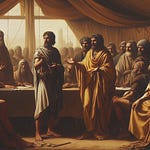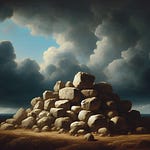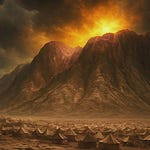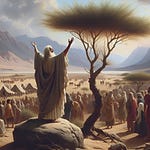Chapter Notes
Have you ever wondered why some people remain in darkness while others enjoy the light of God’s favor?
In Exodus 10, we see God send a profound and tangible darkness over Egypt—a darkness that could be felt—revealing the ongoing futility of Pharaoh’s rebellion.
Commentary
vv. 1–11 - The eighth plague—locusts—is introduced. God reveals His sovereign purpose to Moses. He declares that Pharaoh’s heart is hardened so His signs can be displayed, and that Israel’s power will be known by future generations. Once more, Moses and Aaron confront Pharaoh with the command: let God’s people go. They warn him of the coming devastation—a locust plague so severe it will devour what remains after the hail. Pharaoh’s servants urge him to relent: “Knowest thou not yet that Egypt is destroyed?” In response, Pharaoh calls for Moses and Aaron and offers a compromise: the men may go to worship the Lord. Moses refuses. Partial obedience is not enough. Everyone must go—young and old, sons and daughters, flocks and herds. This sets the stage for the coming judgment.
vv. 12–20 - The plague of locusts is executed. At God’s command, Moses stretches out his rod. An east wind brings a swarm of locusts into Egypt. They cover the land, consuming every plant and fruit left after the hail, until no green thing remains. This vividly shows the total destruction of God’s judgment. Pharaoh urgently calls for Moses and Aaron. He confesses his sin before God and them, pleading for the plague to end. Moses prays, and God sends a west wind that drives the locusts into the Red Sea. Yet, despite this mercy, Pharaoh’s heart hardens once again, and he refuses to let the people go.
vv. 21–29 - The ninth plague—the plague of darkness—is introduced without warning. At God’s word, a thick darkness falls over Egypt for three days. It is a darkness that can be felt. This judgment strikes directly at Egypt’s worship of Ra, their sun god, and reveals the Lord’s supremacy. While Egypt lies immobilized in darkness, the children of Israel enjoy light in their dwellings. Pharaoh calls for Moses, offering to let the Israelites go but demanding that their flocks and herds remain behind. Moses, however, insists that not a hoof shall be left behind. The Israelites must take all they have to worship the Lord. Enraged, Pharaoh threatens Moses with death if he sees him again. Recognizing the finality of Pharaoh’s defiance, Moses solemnly agrees and departs. The chapter ends with a dramatic pause, setting the stage for the climactic tenth and final plague.
Application
God’s Judgments Confront Pride and Idolatry. The plagues of locusts and darkness were deliberate acts of divine justice. They exposed Pharaoh’s pride and the futility of Egypt’s gods. The Egyptians revered the sun as a deity. Yet the darkness showed that their false worship was powerless. Similarly, God’s Word exposes the idols in our hearts—whether in material wealth, career ambitions, or worldly comforts. What are you trusting to guide you? Only God deserves the throne of your heart. Reflect on your priorities. Repent of misplaced trust. Renew your devotion to the one true God.
Satan Targets the Faith of the Next Generation. Pharaoh sought to keep Israel’s children in Egypt. In doing so, he symbolized the spiritual battle Satan wages for the next generation. This is a call to parents to guard and nurture their children’s faith diligently. Scripture commands, “These words, which I command thee this day, shall be in thine heart: And thou shalt teach them diligently unto thy children” (Deut. 6:6–7). Parents, are you leading your children to know and love the Lord? Prioritize family devotions, prayer, and regular worship. Children, remember—you are part of God’s covenant people. Ask Him to help you love Him with all your heart.
Partial Obedience Is Disobedience. Pharaoh’s attempts to bargain with Moses—offering partial concessions—revealed his unwillingness to fully submit to God. Moses’ firm reply, “Not an hoof shall be left behind,” makes it clear: obedience must be complete. Are you holding anything back from God’s service? Partial surrender is no surrender at all. Examine your heart. Commit every part of your life—your time, finances, relationships, and future—to His will.
God’s Judgments Are Severe but Always Just. The escalating plagues demonstrate that God’s judgments, though terrifying, are perfectly righteous. Egypt’s suffering was not arbitrary; it was the result of persistent rebellion and defiance. Likewise, God’s judgment today is a warning against sin and a call to repentance. Scripture reminds us, “If ye will hear His voice, harden not your hearts” (Heb. 3:15). How are you responding to His Word? Let His justice move you to revere Him, and let His mercy draw you to Christ.
God Protects His People Amid Judgment. This theme has been repeated throughout these chapters. During the plague of darkness, God provided light for the Israelites while Egypt was engulfed in gloom. This distinction highlights God’s care for His covenant people, even amid severe judgment. Believers today are secure in Christ, shielded by His grace. Are you resting in His protection? Walk in the light of His Word. Trust Him through every trial, and rejoice in the assurance of His unfailing love.
“What shall God do next with you? Where shall the next arrow be aimed? An eye, a hand, a foot—shall these be smitten? Or shall the Lord lay the cold hand of death upon your heart? Shall “the silver cord be loosed, or the golden bowl be broken, or the pitcher be broken at the fountain, or the wheel broken at the cistern”? I cannot tell how or when the summons may come for you, but I would very earnestly say to any of you who have been the subjects of many providential trials and divine judgments, “How long will it be ere you humble yourselves before God?” — Charles Spurgeon











